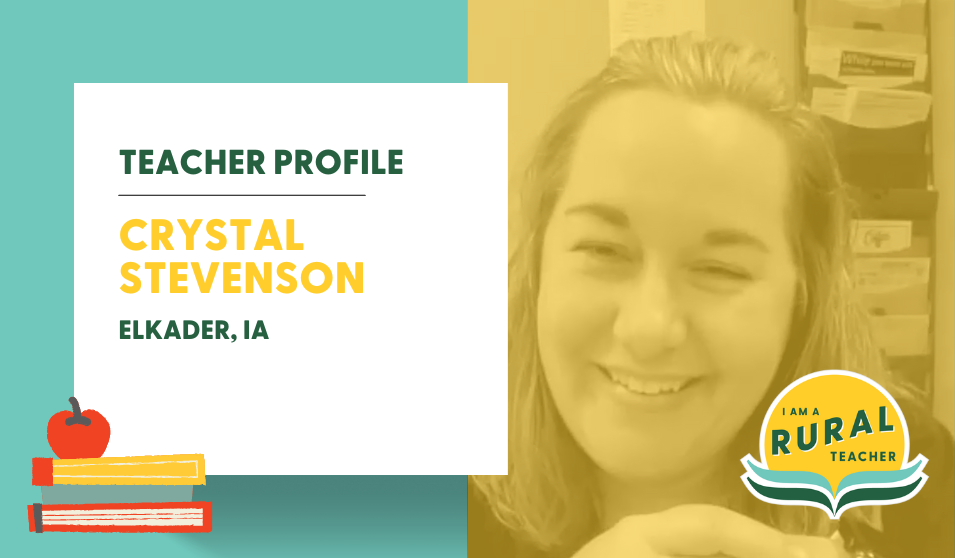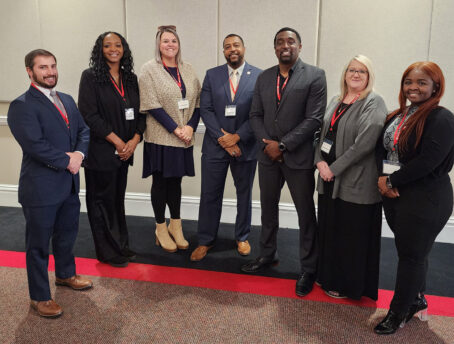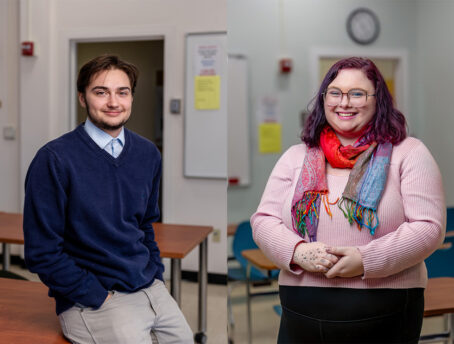Thank you to our Iowa Hub, led by the Community Foundation of Greater Dubuque, for your continued partnership and support in bringing teacher's voices and stories to the forefront of our communities. Special thanks to Amy Mayer from RAPIL and Colleen Mulholland from the University of Northern Iowa for connecting us with Crystal.
Being a teacher is a calling that can reach you at any time of life, even if you are on another career path. Crystal Stevenson is a high school English teacher in rural Iowa who changed careers and began teaching in her mid-thirties. She sat down with Rural Schools Collaborative to talk about how this impacted her life and fulfilled her sense of purpose.
Before she became a teacher, Crystal was in social work, mostly with families. She found that she really enjoyed working with children, and when the time came, this transitioned into work with the local school district:
“We have four children ranging in age from - 11 is our youngest, and 23 is our oldest. Things just got complicated with the job, traveling, and having my own family. So I totally switched pace, and I became a para at our local school and knew that's where I belonged, but I didn't feel like that was the right capacity. I had my bachelor's degree already, so I went through a program called RAPIL, which is an accelerated teaching program, and got my teaching degree in under two years. I was able to work full time in our rural school as an associate while I was doing my teaching degrees.”
Crystal always wanted to stay in a rural place, but this became especially apparent when she started getting involved with the school. She was particularly struck by the connection between school and community:
“I think we're really fortunate; we're a really, really small community. Both my husband and I were from a rural area, so we don't really know anything other than rural Iowa. The one thing I love the most about the community and the school is that we don't talk about them as separate things. Our school does so much for our community, and our community does so much for our school, that we couldn't run either one of those without the other. It would never have crossed my mind to go anywhere else to teach.”
She also sees the advantage in having a smaller class size when she is working with students, allowing her to dive into more complex units:
“I think the smaller, the better. I'm one person, I can only get around and we're talking English-related things. They're not super easy concepts. So I can help them a lot more than I could if I had many, many kiddos in one space.”
Crystal has an intense passion for reading, and she loves getting her students involved with reading in any way she can. She is a big proponent of letting kids find out what they’re interested in and encouraging that passion:
“I am an advocate for letting kids choose. There's so many things that they can learn if they have a little bit of a voice and they can choose things. Whatever they want, I will have it in here for 'em. I just think the more they can get their hands on these books that take them to different places, the better their lives will be. It's just wonderful that they can choose books that they want.”
Not only do students get to experience new ideas and concepts, but through reading books, Crystal sees them gain an understanding of various cultures and walks of life:
“Banned books don't really exist here. I love giving them all sorts of different books, different protagonists, different antagonists, different styles of writing, books in verse, poetry. We live in a really rural area, and it's not very diverse. So why not choose diversity in other means? It's fun to see where they go with the information that they're reading.”

One unique experience that Crystal has as a second-career educator is the way her children’s lives have changed as well:
“I have my own children that I teach, and because I have not always been a teacher, I tried to tell them how things are gonna be different when I'm a teacher. People are gonna look at you differently. They're gonna have a higher expectation for you. And they're adjusting to that. I do think that people look at teachers as leaders, and they look at our children as little leaders.”
The expectation of leadership is something that Crystal embraces with humility, and she is always willing to support others rather than stand in the limelight. However, one student wanted to make sure her efforts did not go unnoticed:
“I had my freshmen write a letter to somebody. We were practicing writing grammar, and I said, ‘Pick somebody that encourages you or that really, really means a lot to you, that you look up to,’ something to that effect. I said, ‘I don't care who it is, I don't care what you talk about. Just somebody that is important to you.’ And one of my freshman girls wrote it to me, and I read it, and I bawled like a baby. I was like, ‘I did all that? That's what I mean to you, really?’ It was such a special moment that I was like, ‘This is why I'm here.’ This is why I'm here. So that was awesome.”
Crystal loves her second career as an educator, and she knows that community support is critical to her - and her students’ - continued success. Thinking about how the rural teaching experience has both unique challenges and advantages, she had the following advice for those interested in the teaching profession:
“Our community and our school really go hand in hand. They say it takes a village to raise a kid. It sure does. And when we have to raise a whole bunch of kids, boy do we need a big village to help with that. Going into teaching itself is challenging, and there's so many things that go into play. Find people that will help you and just hang on tight to them because it's not a one man band. That's what people need to remember. Don't do it by yourself.”
We are grateful to Crystal for sharing her story with us about her experience as a teacher in rural Iowa. If you would like to share 30 minutes of your time for an interview, please reach out to us at info@ruralschoolscollaborative.org. The I Am A Rural Teacher campaign is a collaborative effort with the National Rural Education Association and made possible through a grant from the Bill & Melinda Gates Foundation.




